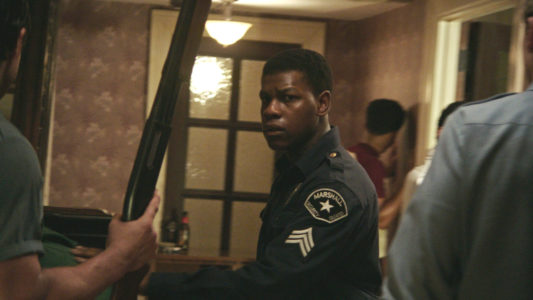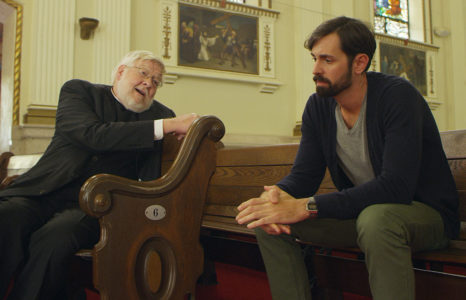By John Mulderig
NEW YORK (CNS) – Tech savvy viewers will especially enjoy the wacky proceedings of “The Emoji Movie” (Columbia). But patrons of all stripes will appreciate the film’s themes of loyal friendship and faithful romance.
Set within the smartphone of high school freshman Alex (voice of Jake T. Austin), this lighthearted animated comedy tracks the adventures of a trio of misfits on their quest to reach the internet Cloud.
Gene (voice of T.J. Miller) is a “Meh” icon meant to express only indifference. But the first time Alex makes use of him, the native enthusiasm of his personality, together with nervousness at making his professional debut, causes him to register a strange mix of emotions instead of the bland apathy he was supposed to convey.
This malfunction immediately makes Gene an outcast and draws the ire of the chief emoji, maniacally cheerful Smiler (voice of Maya Rudolph). She condemns Gene to be deleted. So he goes on the run, and joins forces with upbeat hand symbol Hi-5 (voiced by James Corden) and rebellious codebreaker Jailbreak (voice of Anna Faris).
Once one of Alex’s favorites, Hi-5 has fallen into disuse and longs to regain his former popularity. Jailbreak resents the regulated life she is forced to lead on the phone, and hopes to enjoy much greater freedom by transferring herself permanently to the Cloud.
As the three newfound friends bond, and something more than friendship blossoms between Gene and Jailbreak, the challenges of their journey force them to prove their mutual devotion. Messages about teamwork and putting the interests of others ahead of your own goals balance the emphasis on Gene’s right to break the mold and be himself.
The presence of a minor character named Poop – voiced, amusingly, by no less a personage than Sir Patrick Stewart – typifies the predictable potty humor running through director and co-writer Tony Leondis’ script, penned with Eric Siegel and Mike White. Together with episodes of peril, these jokes may make “The Emoji Movie” a less than ideal choice for the youngest film fans.
The feature is preceded by an eccentric, enjoyable short called “Puppy!” which involves a young lad, a giant, disruptive dog named Tinkles and the boy’s indulgent grandfather – who just happens to be Count Dracula.
The film contains characters in jeopardy, mild scatological humor, a suppressed crude expression and a slightly crass term. The Catholic News Service classification is A-II – adults and adolescents. The Motion Picture Association of America rating is PG – parental guidance suggested. Some material may not be suitable for children.

Alex, voiced by Jake T. Austin, appears in the animated movie “The Emoji Movie.” The Catholic News Service classification is A-II — adults and adolescents. The Motion Picture Association of America rating, PG-13 — parents strongly cautioned. Some material may be inappropriate for children under 13. (CNS photo/Sony) See MOVIE-REVIEW-EMOJI-(EMBARGOED) July 27, 2017.
By Joseph McAleer
NEW YORK (CNS) – A dark chapter of the Motor City’s history is revisited in “Detroit” (Annapurna), a searing period drama.
The setting is the summer of 1967, when race riots broke out in several cities across the country. In Detroit, simmering discontent over systemic discrimination and growing unemployment erupted in African-American neighborhoods. As protesters clashed with police, businesses were set afire and looting was widespread.
The crisis, which lasted four days, resulted in 43 dead, over 7,200 arrests, and the destruction of more than 2,000 buildings. “Detroit” zeroes in on one notorious incident of the so-called “12th Street Riot”: the police raid of the Algiers Motel that caused the death of three unarmed men and the brutal beating of several others.
As violence engulfed the city, the hotel became a refuge of sorts, harboring both innocent patrons and shady characters. Among the former are Larry Reed (Algee Smith) and Fred Temple (Jacob Latimore), members of an up-and-coming musical group, The Dramatics. Separated from their friends, they seek shelter at the Algiers.
At the hotel pool they meet two giggly prostitutes, Karen (Kaitlyn Dever) and Julie (Hannah Murray), white women from Ohio who are making the most of the “Summer of Love.”
Upstairs, 17-year-old Carl Cooper (Jason Mitchell) decides to show off by shooting blanks from a toy pistol. Turning his attention to the growing police presence outside, he next fires the gun into the crowd.
Suspecting a sniper, the police respond in droves, and a reign of terror descends on the Algiers and its residents, including Greene (Anthony Mackie), a decorated Vietnam vet.
The raid is led by a trigger-happy cop, Philip Krauss (Will Poulter), who has a reputation for shooting looters in the back. Krauss rounds up everyone and, with the assistance of fellow officer Flynn (Ben O’Toole), unleashes a ruthless, demeaning interrogation.
A witness to the unfolding horror is Melvin Dismukes (John Boyega), a black security guard charged with protecting a nearby grocery store from looters. Dismukes suspects wrongdoing, and inserts himself into the maelstrom at a key moment.
Needless to say, “Detroit” is not for the squeamish. Kathryn Bigelow (“Zero Dark Thirty”), working from a script by Mark Boal, directs at a furious, gut-wrenching pace, placing the viewer in the very center of the fast-moving storm and incorporating real-life news footage to enhance the immediacy.
However, though graphic, the portrayal of police brutality is never gratuitous. Coupled with the subsequent miscarriage of justice, the harrowing events re-enacted in “Detroit” offer a powerful reminder to mature viewers of a sad but significant incident in America’s past.
The film contains intense bloody violence and torture, brief female nudity and pervasive profane and crude language. The Catholic News Service classification is L – limited adult audience, films whose problematic content many adults would find troubling. The Motion Picture Association of America rating is R – restricted. Under 17 requires accompanying parent or adult guardian.

John Boyega stars in a scene from the movie “Detroit.” The Catholic News Service classification is L — limited adult audience, films whose problematic content many adults would find troubling. The Motion Picture Association of America rating is R — restricted. Under 17 requires accompanying parent or adult guardian.(CNS photo/Annapurna Pictures) See MOVIE-REVIEW-DETROIT Aug. 2, 2017.
By John Mulderig
NEW YORK (CNS) – The annulment process provides the unusual courtroom setting for the romantic drama “The Tribunal” (Freestyle). While the movie’s Catholic values are strong, they come filtered through some faulty filmmaking.
Divorced musician Joe Seacker (Chris Petty) pursues a decree of nullity so that he can wed his devout girlfriend, Emily Vanderslice (Laura Mock). But his case requires the testimony of his estranged former bandmate and best friend, Tony Mirakul (Ryan Wesley Gilreath).
Tony was once Emily’s boyfriend, and still carries a torch for her while also harboring resentment against Joe for stepping into his shoes after he and Emily split. But Tony has firsthand knowledge of the fact that Joe’s ex, Jessie (Victoria McDevitt), disdained the permanence of marriage as well as the prospect of having kids.
Joe’s cause is represented by Emily’s father, Ben (Jim Damron), and opposed by the tribunals’ “defender of the bond,” Michael Constantino (Chuck Gillespie). Both men are permanent deacons.
Religious themes, including the countercultural message that sex before marriage is a damaging mistake as well as a sin – Tony’s seduction of Emily was the eventual cause of their breakup – will resonate with viewers of faith. But sometimes subpar acting, an amateurish musical score and unlikely plot developments chip away at this small-scale project’s credibility.
Still, the good intentions motivating screenwriter Michael C. Mergler and director Marc Leif are as obvious as they are honorable. And moviegoers used to being immersed in the loose morals of contemporary society will find the earnest ethics surrounding this love triangle a refreshing change.
In that light, at least some parents may consider “The Tribunal” acceptable for older teens, despite the elements listed below.
The film contains bedroom scenes, including a nongraphic premarital sexual encounter, some irreverent images, a mild oath and a few crass terms. The Catholic News Service classification is A-III – adults. The Motion Picture Association of America rating is PG-13 – parents strongly cautioned. Some material may be inappropriate for children under 13.

Tom Morton and Ryan Wesley Gilreath star in a scene from the movie “The Tribunal.” The Catholic News Service classification is A-III — adults. The Motion Picture Association of America rating is PG-13 — parents strongly cautioned. Some material may be inappropriate for children under 13. (CNS photo/107 Productions) See MOVIE-REVIEW-TRIBUNAL July 27, 2017.
